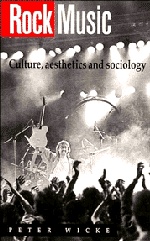Book contents
- Frontmatter
- Contents
- About the author
- Preface
- 1 ‘Roll Over Beethoven’: new experiences in art
- 2 ‘Rock Around the Clock’: emergence
- 3 ‘Love Me Do’: the aesthetics of sensuousness
- 4 ‘My Generation’: rock music and sub-cultures
- 5 ‘Revolution’: the ideology of rock
- 6 ‘We're Only in It for the Money’: the rock business
- 7 ‘Anarchy in the UK’: the punk rebellion
- 8 ‘Wild Boys’: the aesthetic of the synthetic
- 9 Postscript: ‘The Times They Are A-Changing’
- Notes
- Bibliography
- Discography
- Index of people and groups
- General index
2 - ‘Rock Around the Clock’: emergence
Published online by Cambridge University Press: 01 June 2011
- Frontmatter
- Contents
- About the author
- Preface
- 1 ‘Roll Over Beethoven’: new experiences in art
- 2 ‘Rock Around the Clock’: emergence
- 3 ‘Love Me Do’: the aesthetics of sensuousness
- 4 ‘My Generation’: rock music and sub-cultures
- 5 ‘Revolution’: the ideology of rock
- 6 ‘We're Only in It for the Money’: the rock business
- 7 ‘Anarchy in the UK’: the punk rebellion
- 8 ‘Wild Boys’: the aesthetic of the synthetic
- 9 Postscript: ‘The Times They Are A-Changing’
- Notes
- Bibliography
- Discography
- Index of people and groups
- General index
Summary
It was the Eisenhower era, from 1953 to 1960, which shaped the everyday experiences to which rock‘n’roll was linked; the era of the cold war, a period which saw the conservative restoration of American capitalism and its seemingly limitless economic growth. The Second World War had dragged the USA out of the depression of the thirties. The victory over fascist Germany and its Axis partners Italy and Japan had been an overwhelming one. It had been a just victory, so that these days we are no longer surprised at the glorification of this victory afterwards. The returning war veterans had a right to be feted as national heroes. They now wanted nothing more than a little peace and to catch up on what they had missed: earning money, family life, the dream of prosperity. Against this background their relationship with the ideas of liberalism and bourgeois democracy, for which they had fought in the war, was bound to become increasingly uncritical. The result was an anachronistic nationalism which became the dominant ideology. According to David Pichaske: ‘What the golden fifties were really about was the unnatural prolongation of World War II heroism and mindset, both of them narrow and atavistically barbarian during the war years, both of them narrow and anachronistically barbarian in the fifties.’
- Type
- Chapter
- Information
- Rock MusicCulture, Aesthetics and Sociology, pp. 28 - 47Publisher: Cambridge University PressPrint publication year: 1990
- 3
- Cited by

